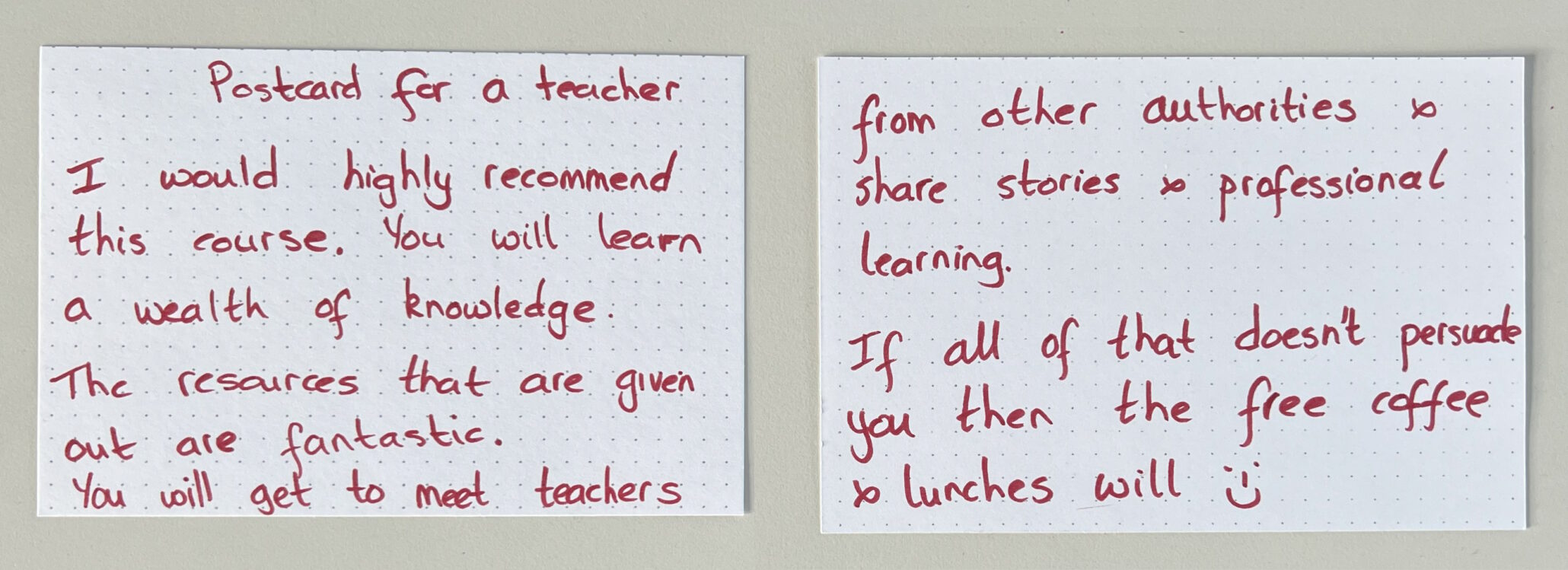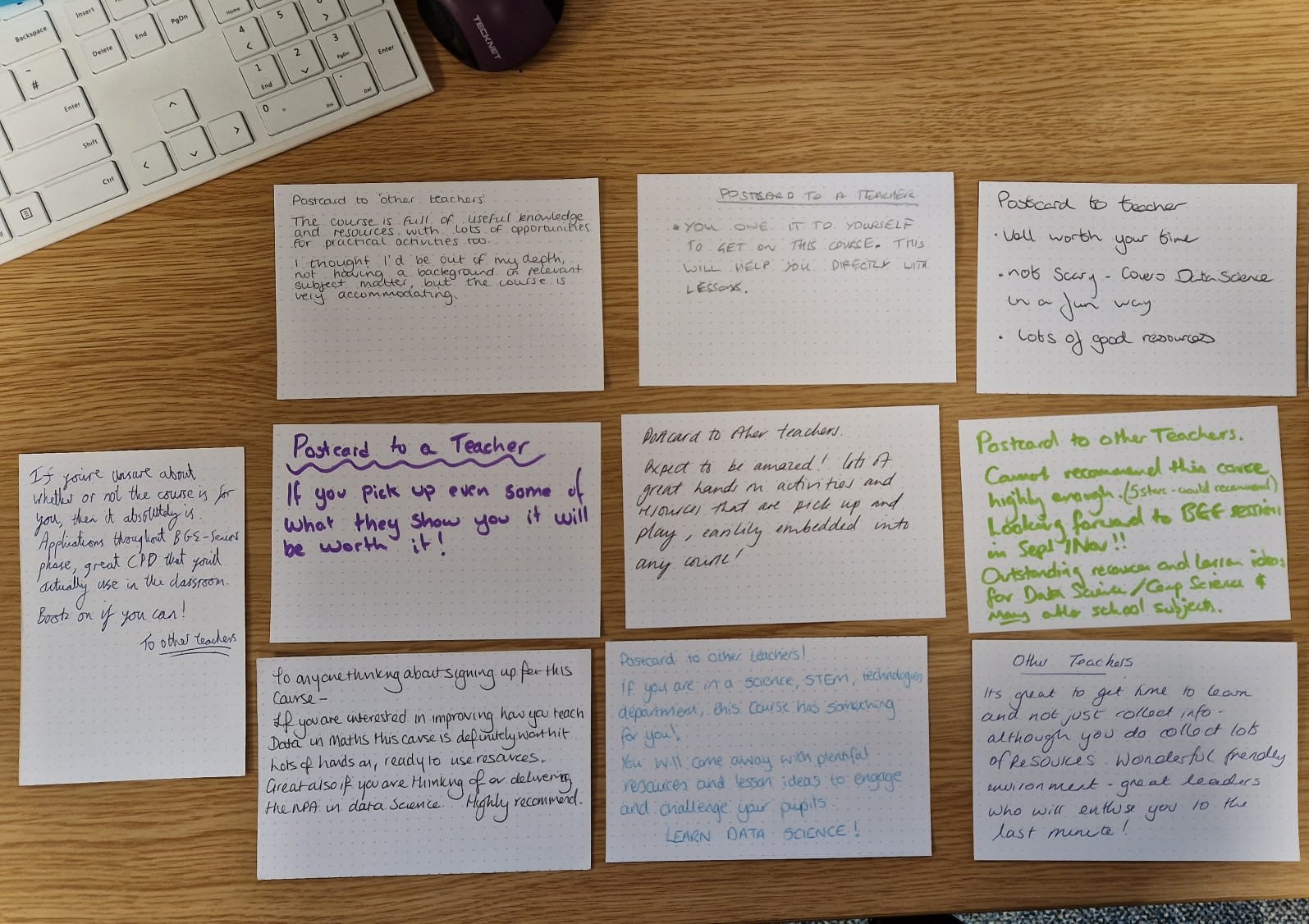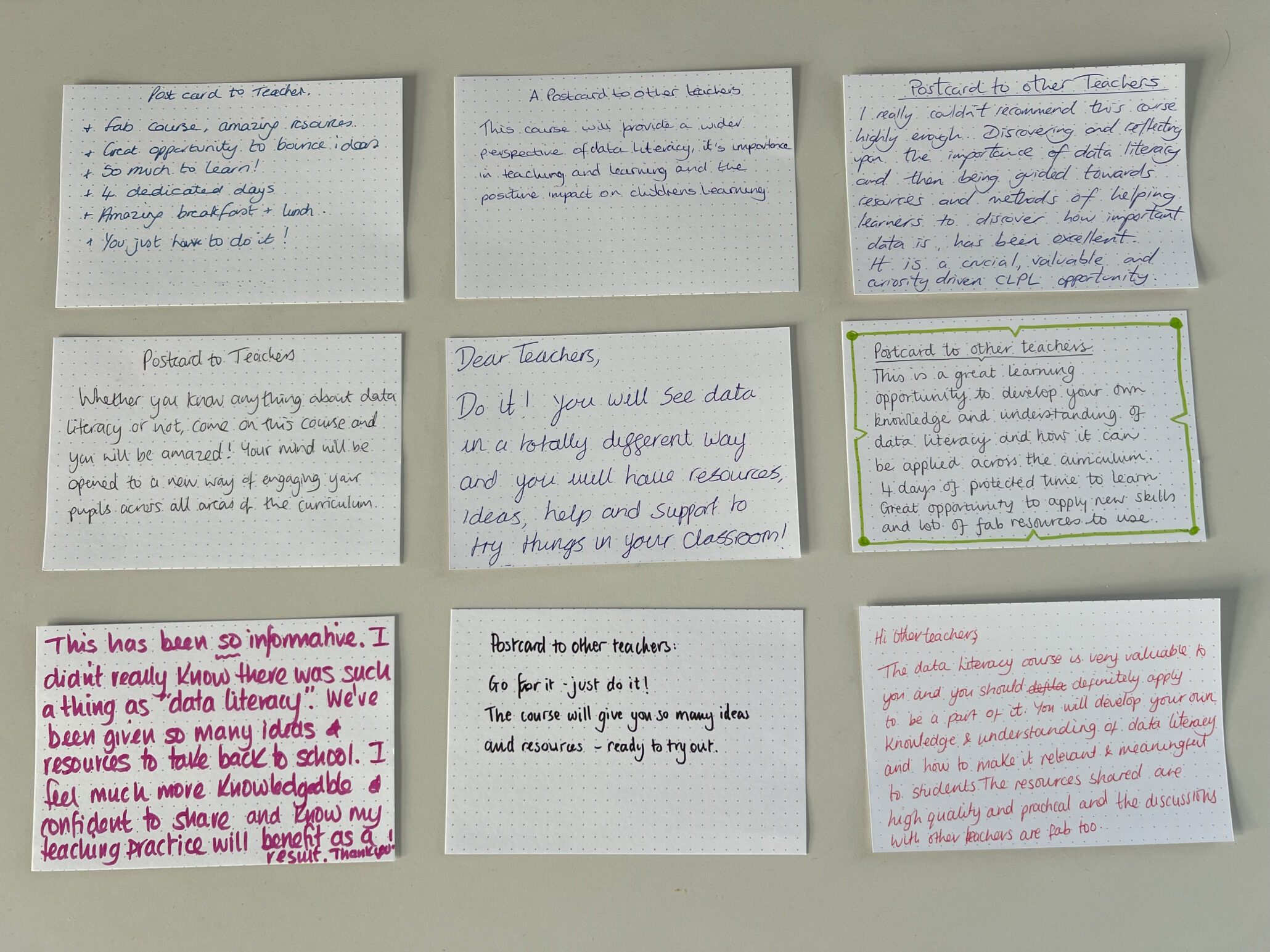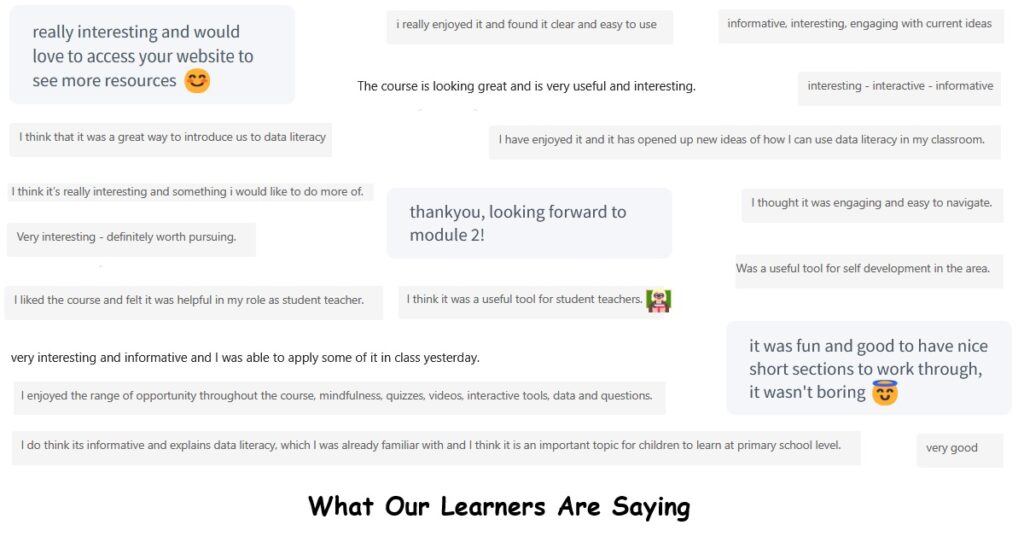Our courses:
- 4 Day AI and Data Literacy course (secondary teachers)
- 4 Day AI and Data Literacy course (primary teachers)
- Online Data Literacy course for student teachers and probationers
Data science is the ability to ask questions, collect, analyse, interpret, communicate about data. As technology makes it easier to collect vast amounts of data, the skills to use data to solve problems fairly will become even more important.
AI advances are transforming human society and the ways we handle data, and are likely to inform future developments in education too. New for this year, our courses will also cover the teaching of responsible AI Literacy in schools. We will base this around our brand new curriculum framework for AI education in Scotland, developed with Scottish Government and Education Scotland, and our new cross-curricular resources available at trails.scot.
The courses, developed by experts in the field of digital, data, and AI literacy and both primary and secondary teaching, are an innovative and exciting opportunity for professional development.
While exploring the options for primary and secondary teachers below, read our collections of “postcards” written by our 2023/24 course participants!

Courses
4 Day AI and Data Literacy course (secondary teachers and senior leaders)
THE COURSE IS NOW FULL AND APPLICATIONS ARE CLOSED!
Data Education in Schools is offering a free course on data and AI literacy in the secondary classroom. We still have funded places available.
Teachers attending the course in 2023/24 said:
“I’ll struggle to find more enjoyable, worthwhile and welcoming CPD!”
“The course was an excellent interactive experience with a lot of fantastic opportunities to experience new things.”
There will be four full-day sessions on Thursday 18th September 2025, Wednesday 8th October, Tuesday 4th November, Monday 1st December. The sessions are face to face (following feedback by teachers on previous workshops) but it may be possible to join virtually if required. You will need to attend all of the sessions.
The course will be taught by Dr Jasmeen Kanwal and Kate Farrell, and will include collaboration with data scientists, colleagues in industry, and educational experts.
Topics covered will include:
- Exploring how data is used to solve real life problems. From coronavirus dashboards in the newspaper, to the smart meters in your cupboard, to the Fitbit in your pocket: data displays are everywhere. We’ll consider how data can be used ethically to make decisions and improve our lives.
- Teaching strategies and core concepts: We’ll explore how to develop strategies to ensure that every learner participates meaningfully in opportunities to develop their data literacy. We will identify digital and non-digital pedagogical approaches to teaching data science, and explore how this may enrich the ways in which all learners are included in class activities. We will also look at ways to engage learners in data for social good projects and activism, using data to benefit their schools and communities.
- Data Science and AI within BGE: We will look at projects, resources and ideas for teaching Data and AI Literacy within different curricular areas of Broad General Education.
- NPA Data Science: We will cover the core concepts in the National Progression Award in Data Science (Levels 4-6)
There are 15 places for teachers on the course. All Secondary school teachers in the South East of Scotland (City of Edinburgh, Fife, Borders, East Lothian, Midlothian and West Lothian) may submit an application for a place. Teachers from other parts of Scotland can apply too, however, we will not be able to fund cover costs for their places. Preference will be given to teachers who will be delivering the NPA in 2025-26 or who work in schools who are working to close the attainment gap, or to improve their technology provision.
We will contribute at least 50% of the cost for classroom cover for the four days.

How to apply?
When applying to the course, teachers must commit to: attend all sessions; try out the course materials at their school; take part in research data collection activities; and share their knowledge with other teachers.
Please fill out the online application form. Any queries, contact Jasmeen.Kanwal@ed.ac.uk.
4 Day AI and Data Literacy course (primary teachers and senior leaders)
THE COURSE IS NOW FULL AND APPLICATIONS ARE CLOSED!
Data Education in Schools is offering a free course on data literacy in the primary classroom. Primary teachers attending the course in 2022/23 have said:
“This course has given me the confidence and desire to present the data work that I do with children in a more engaging way”
“…a really supportive and positive experience”
There will be four full-day sessions on (Wednesdays) 24th September 2025, 26th November, 28th Jan 2026, 25th March. All sessions will be taught face-to-face and held in central Edinburgh. You will need to attend them all. The course will be taught by Kate Farrell and Dr Jasmeen Kanwal and will include collaboration with data scientists, colleagues in industry, and educational experts.
Topics covered will include:
-
- Exploring how data is used to solve real life problems. From election dashboards in the newspaper, to the smart meters in your cupboard, to the Fitbit in your pocket: data displays are everywhere. We’ll consider how data be used ethically to make decisions and improve our lives.
- The data problem solving cycle. We’ll learn about the Problem Plan Data Analysis Conclusion (PPDAC) cycle for data problem solving, and how you can teach this process to your learners in real life projects, both with and without technology.
- Links, strategies and big questions: We’ll explore how to develop strategies to ensure that every child participates meaningfully in opportunities to develop their data literacy. We will identify digital and non-digital pedagogical approaches to teaching data literacy, and explore how this may enrich the ways in which all learners are included in class activities.
- AI Literacy: We will also look at resources available for teaching Primary learners the basics of how AI works, as well as ethical and sustainability issues around AI, AI and children’s rights, and critical thinking in a world with AI-generated content.
There are 15 places for teachers on the course. All primary school teachers in the South East of Scotland (City of Edinburgh, Fife, Borders, East Lothian, Midlothian and West Lothian) may submit an application for a place. Teachers from other parts of Scotland can apply for this course too, however we will not be able to fund cover costs for their places. Preference will be given to teachers in schools that have not previously participated in this course, who are working to close the attainment gap, or to improve their technology provision.
We will contribute at least 50% of the cost for classroom cover for the four days.

How to apply?
When applying to the course, teachers must commit to: attend all sessions; try out the course materials at their school; take part in research data collection activities; and share their knowledge with other teachers.
Please fill out the online application form. Any queries, contact Jasmeen.Kanwal@ed.ac.uk.
Online course for student teachers and probationers




